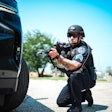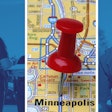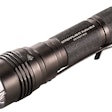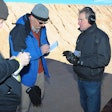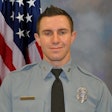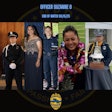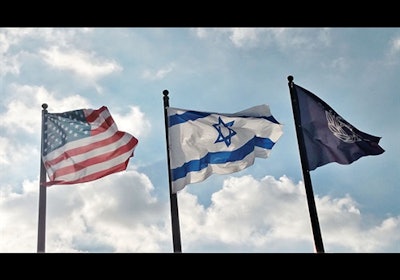
Last September some 50 members of the Police Unity Tour, plus a few friends, gathered at Newark Airport for a 10-hour flight to Israel. It was the culmination of months of planning by our host, Mike Safris, whose Jewish heritage, law enforcement background, and love for Israel inspired the trip. By Mike's count, he had been to Israel 37 times, and he wanted to share the experience with the rest of us while forging some special ties between the police in both countries. Working with Major General David Bitan, Southern District commander of the Israel Police, the trip was authorized and planned.
Fifteen of the members of our delegation were Jewish, but most of us had never been to Israel. When Mike reached out to me and others about making the trip, it was one of those offers you simply did not want to turn down—seven days in Israel touring some of the most iconic places in the history of humankind. Adding to the trip's appeal, we would be meeting Israeli law enforcement officers who had shared values, unique experiences, and expertise honed by years of combating terrorism.
The timing of the trip was no coincidence. We would be in Israel on the 15th anniversary of 9/11, the deadliest terrorist attack ever to occur anywhere in the world.
The Academy
Stepping off the plane in Tel Aviv after a 10-hour direct flight, we were greeted by two old friends, Yoni Zeitek and Yosi Farajun. They were accompanied by Carol Hasidim. Yoni and Yosi had visited us in America and Yosi had actually ridden in the Police Unity Tour several years before. Carol was new to us, but she would leave quite an impression over the next week. All three made sure we made it through customs without any problems and then it was onto a waiting bus for a one-hour trip to the Israel National Police Academy, our temporary home during most of our stay in Israel.
The Police Academy is a state-of-the-art facility that looks more like a college campus than the training ground for one of the world's most elite police forces. The recruits who shared the space with us appeared younger than their counterparts in the United States, perhaps because of Israel's mandate that each man and woman after graduating high school serve a minimum three-year stint in the Israeli military or law enforcement.
The current recruit class gathered in a central plaza for a formal ceremony to welcome us. The flags of the United States and Israel were raised to the accompaniment of our respective national anthems followed by brief welcoming remarks from Brigadier General Haim Blumenfeld, who was the top official at the Academy. The media's presence at the event emphasized the significance of our visit to Israel.
Our first full day in the country was filled with a whirlwind tour of the Academy and all it had to offer. We were treated to a defensive tactics training demonstration where all of the participants were police instructors who were black belt masters of martial arts, witnessed expert demonstrations showing how the Israeli police capture criminals and terrorists on the roadways using precision driving and tactical techniques, and participated in a firearms training simulation.
During that simulation we saw how a misplaced shot to the body of a hostage taker, instead of the head, can result in the death of an innocent person. Two of the officers in our group shot and killed a would-be robber at an ATM machine during the simulated training exercise, but were warned that a couple of the shots they fired might have endangered innocent passersby. The exercise reinforced that the decisions officers have to make are not always easy.
A visit to the shooting range was next on the agenda and this would give all of us a chance to fire the handgun of choice for the Israeli police, the Jericho 9mm. We learned that the Israeli police have a policy preventing them from chambering a round in their guns while on patrol. This means about a half-second slower reaction time for officers if they need to fire their weapons, but they feel this more cautious approach means fewer chances of accidental shootings.
 Photo: NLEOMF
Photo: NLEOMF
Our first day ended with a very moving visit to Israel's National Police Memorial and Museum. The Memorial visit included a wreath laying ceremony. I was honored to place the wreath on behalf of our delegation in memory of the 1,445 Israeli police officers who had up to that point died in the line of duty dating back to 1948 when Israel first became a nation. To put this number in perspective, Israel has about 30,000 officers serving today, a little less than the size of New York City's police force. While some 760 New York City Police Officers have died in the line of duty in more than 200 years, Israel has lost nearly double that number in just 68 years.
One of the highlights of the Police Museum visit was the quote on the wall as we entered. It was from Israel's first prime minister, David Ben-Gurion, and it read: "The Army is [Israel's] security, the police—its honor." At a time when the support for law enforcement is being questioned in America, our officers needed this morale booster.
The Unity Tour
The second day of our trip was certainly one of the highlights and one of the main reasons we came to Israel. The Police Unity Tour has raised $20 million over the past 20 years by riding bicycles hundreds of miles in the United States to support the National Law Enforcement Officers Memorial Fund and American officers who have made the ultimate sacrifice. So, in a symbolic show of unity in the global war against terror, 50 U.S. law enforcement officers participated in a 25-kilometer (a little more than 15.5 miles) bike ride with 50 Israeli officers, including the deputy commissioner of the Israel National Police, Zohar Devir.
The ride, which started in the city of Ofakim, was largely off road on a dirt path. The sky was cloudless and with the desert sun pushing temperatures above the 90-degree mark, conditions were difficult, making completion of the ride especially fulfilling.
Seeing the Sights
Next we went on a sightseeing trip to Masada and the Dead Sea in southern Israel. Masada is the most popular tourist attraction in Israel. It is a mountain that once was the site of a second home to King Herod the Great. In the year 72 A.D., however, Masada was home to a group of about 1,000 Jewish rebels. While not posing any real threat to Roman authority, the Jewish rebels were a thorn in the side of the Romans, who ruled the area and wanted to eliminate any possible dissent.
The Romans sent a force of 15,000 Roman soldiers and slaves to Masada to finish off the Jewish rebels once and for all. They were so determined to attack the Jewish rebels that they spent three months building an earthen ramp that would allow them to breach the rebels' fortress. But when the Roman soldiers finally got to the top and entered the compound, they found that 960 of the rebels had committed a mass suicide. They chose death and freedom over slavery. The courageous decision of those Jewish rebels some 2,000 years ago has become a legendary tale that has inspired the besieged nation of Israel and the millions of foreign visitors who make the journey each year to Masada.
After a quick dip in the Dead Sea, the lowest point on the face of the Earth with water so salty that swimmers float on the surface and not a single fish lives there, we took a bus ride to the border with Gaza, escorted by no less than seven police vehicles—more than at any time on our trip.
On the Border
Several Israeli Border Patrol officials were there to meet us and explain the difficulty of their job. Gaza, which was home to both Israelis and Palestinians until 2005 when all Jewish settlers were forced to move out by the Israeli Government, is now the stronghold of the terrorist group Hamas. Hamas is the enemy of Israel and has launched massive rocket and missile attacks into the Jewish state. Its operatives have also infiltrated Israeli territory to execute suicide bombings and other attacks. The Border Patrol's job is to keep Hamas' terrorists out of Israel.
They told us one story that was simply beyond belief. A man from Gaza had a very serious illness and he was treated successfully at an Israeli hospital over a three-month period. The man and his wife returned to Gaza, only to have the woman arrested as she re-entered Israel armed with a suicide bomber vest. Her intended target was the Israeli doctor who had treated her husband and saved his life.
Sacred Sites
On Sunday September 11, we traveled to Jerusalem for a special ceremony commemorating the 15th anniversary of 9/11. Jerusalem is home to the only 9/11 memorial outside of the United States that lists all 2,977 victims of that day's terror attacks, whether they were killed in New York City, in Pennsylvania, or at the Pentagon. The U.S. Ambassador to Israel, Daniel Shapiro, spoke that day at the memorial. He was followed by retired Perth Amboy (NJ) Police Officer Ben Salerno, who told the moving story of Richard Rodriguez, one of the 37 Port Authority police officers who died at Ground Zero.
A trip to the Holocaust Memorial Museum, Yad Vashem, was next on the agenda. Our tour guide took us on a 90-minute tour that included the story of a young girl named Lilly, who was separated from her mother, father, grandparents, and siblings at the Auschwitz death camp in Poland and would be the only one to survive. Even the guide, who had certainly told Lilly's story many times before, teared up while recounting the tragedy of this young girl.
The Holocaust stole the lives of more than 6 million Jews. The enormity of the loss was driven home when we were told that it would take over 11 years to read all of their names. Sadly, we were informed that we only know the names of about 4.2 million of the slaughtered—the rest are known only to God.
Leaving Yad Vashem, we toured the Old City of Jerusalem and attended a presentation by the commander of the Jerusalem Police District. Clearly, he and his officers have their hands full trying to keep the peace in the holy city, which is home to Muslims, Jews, and Christians.
The next day we visited the Christian sites in northern Israel, which include Nazareth, the Sea of Galilee, and the Jordan River. That was our second to last day in Israel.
The Bomb Squad
Our final day brought us back to Tel Aviv. It started with a visit to the Tel Aviv Police District Station where we were greeted with a moving memorial to the police officers who have died while serving that city.
We were then treated to a riveting presentation by the Tel Aviv District bomb squad commander, who discussed some of the many terrorist bomb attacks in Israel over the years. In fact, Israel has experienced more than 1,400 terrorist attacks throughout its history, resulting in more than 3,500 deaths. Many of these deaths have resulted from rocket, missile, and suicide bomber attacks.
Israel's bomb squad is second to none in the world. Sadly it can claim that elite status because it gets a lot of work. The emphasis, we were told, is for the bomb squad members to keep a safe distance while neutralizing the potential threats. They showed us an example of the robots that are now used routinely to prevent injuries to officers. The robots are now so refined that they can perform all of the dangerous functions that were once done by the officers at great personal risk of injury or death.
We were also informed that all homes and businesses constructed since the 1980s must have a safe room or bomb shelter. The Iron Dome anti-missile program has become so effective and sophisticated that a warning system goes off only in an area being targeted by a missile and the people in that area know to go to their safe room or shelter. They do so without panic, comforted in the knowledge that the Iron Dome system will most likely shoot the missile down before it causes any damage and their safe room will protect them if the missile should get through. A tough way of life, to be sure, but the people of Israel and their law enforcement professionals have adapted to their unique challenges and threats.
Heading Home
After seven days in Israel, it was time for our farewell dinner with our Israeli police hosts. Israel National Police Commissioner Roni Alsheck attended the dinner and we exchanged gifts of appreciation with him and his police colleagues. During my remarks, I commented on how humbling this experience has been. We were able to commemorate 9/11 and our war on terror in a nation that has been fighting terrorism since its inception. The Israeli people live with this threat each and every day, but they stand strong.
We learned a lot from their experience and expertise and strengthened an important bond. We also realized just how much our Israeli police colleagues appreciate and value the friendship and supportive relationship we have between our two nations.
In the end, we expressed our hope that we can have a delegation of Israeli police join us for a future Police Unity Tour. And now that the Police Unity Tour has crossed into international territory, there are plans in the works to visit other countries and build new unity relationships.
Craig W. Floyd is founding president and CEO of the National Law Enforcement Officers Memorial Fund.








